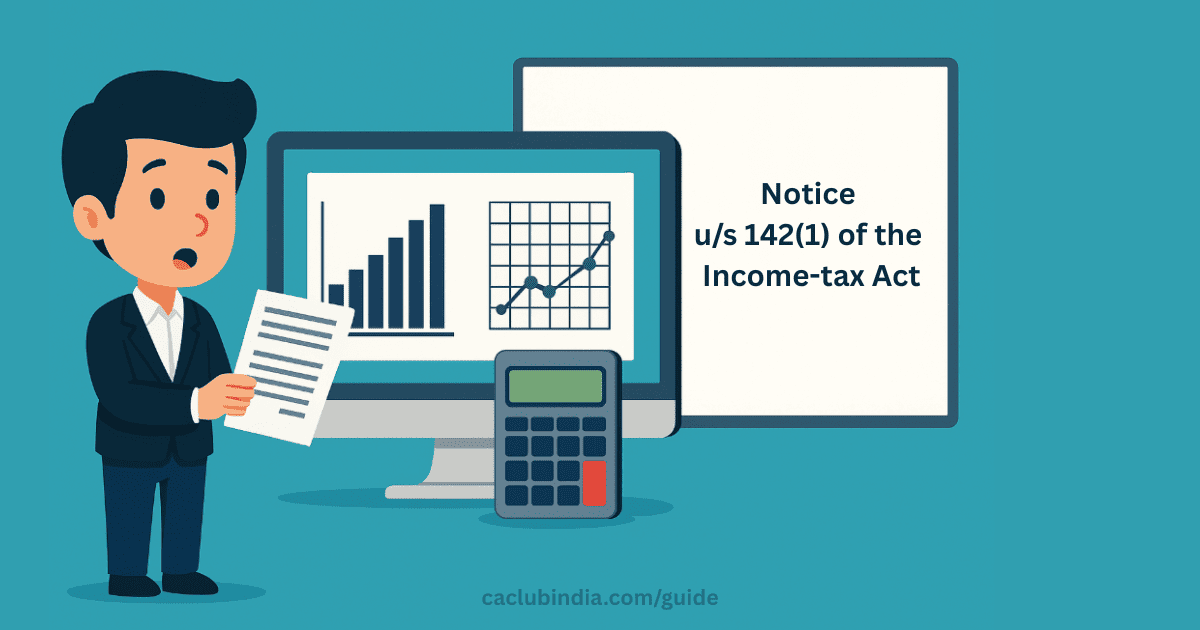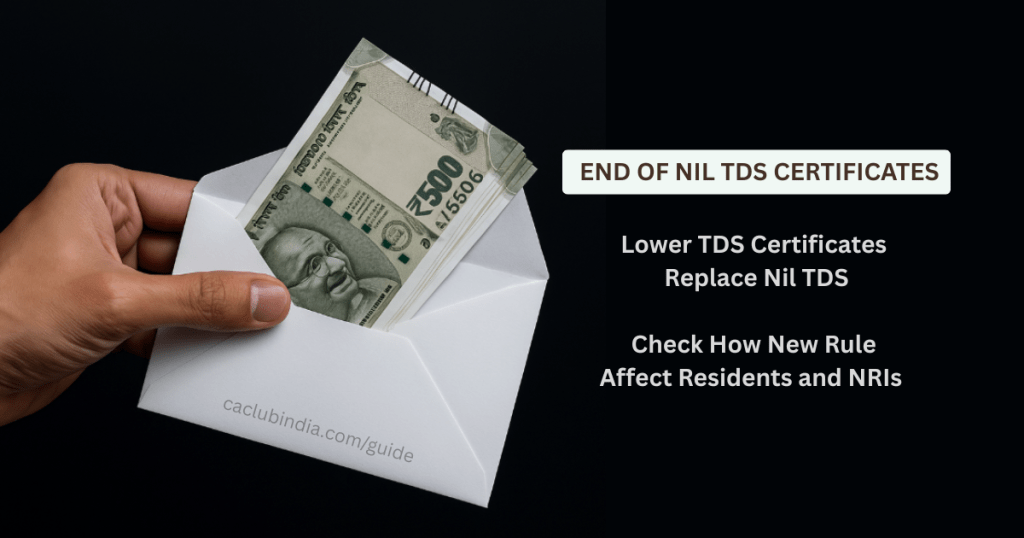A Section 142(1) notice under India’s Income Tax Act, 1961, is an official communication from the Income Tax Department to a taxpayer. Essentially, it is an inquiry notice sent before the final assessment to request additional information or documents, helping the Assessing Officer (AO) accurately complete the tax assessment.
Reasons for Issuance
A Section 142(1) notice may be issued for several reasons:
- Non-filing of Income Tax Return (ITR): If you haven’t filed your ITR by the due date, the Assessing Officer (AO) can issue this notice, instructing you to file it within a specific timeframe.
- Verification of Filed ITR: Even if you’ve filed your ITR, the AO might send this notice to ask for particular documents, accounts, or explanations to confirm the details you’ve provided.
- Discrepancies or Inconsistencies: If the Income Tax Department (ITD) spots differences between your declared income and other information they have (like Form 26AS, Annual Information Statement (AIS), or Taxpayer Information Summary (TIS)), they may issue a notice.
- High-Value Transactions: If you’ve been involved in significant transactions, such as property deals or large bank deposits, the AO might use this notice to inquire about the source of your funds or request more details.
How to respond to a notice u/s 142(1)?
- Read Carefully: Understand exactly what information or documents the notice is asking for. Note the Assessment Year (AY) and the deadline.
- Gather All Relevant Documents: Collect all proofs, statements, bills, and explanations related to the queries raised in the notice. Be thorough and accurate.
- Respond Online: The primary method for responding is through the Income Tax e-filing portal under the “e-Proceedings” or “Compliance” section. Be
- Comprehensive: Address each point raised in the notice clearly and factually.
- Attach Supporting Evidence: Upload clear scans/PDFs of all supporting documents.
- Timeliness is Crucial: Respond within the deadline specified in the notice (usually 15-30 days). You can request an extension in writing to the AO if genuinely needed.
- Seek Professional Help: If the notice is complex, involves significant amounts, or you’re unsure how to proceed, consult a Chartered Accountant (CA) or tax professional. They can help draft the response and represent you.
- Keep Records: Always download and save the acknowledgement receipt after submitting your response online. This is proof of your timely compliance.
What type of information is required in the section 142(1) notice?
Here’s a breakdown of the common types of information required:
If the Notice is issued for Non-filing of Income Tax Return (ITR)
The most basic requirement here is to furnish your Income Tax Return for the specified Assessment Year. This implies providing all the necessary details and computations that would typically go into an ITR, including:
- Gross Total Income
- Deductions
- Exemptions
- Taxes Paid
- Bank Account Details
- Personal Information
If the Notice is issued when an ITR has been filed, but more information/documents are needed:
This is where the requests become more specific. The AO seeks to clarify discrepancies, verify claims, or obtain supporting evidence. Common types of information and documents requested include:
A. Financial Records and Accounts:
- Books of Accounts
- Bank Statements
- Financial Statements
- Sales and Purchase Registers
- Fixed Asset Register
B. Proof for Income, Deductions, and Exemptions:
- Proof of Income:
- Salary
- House Property
- Capital Gains
- Business/Profession
- Other Sources
Proof of Deductions (e.g., under Chapter VI-A):
- Section 80C: Life insurance premium receipts, PPF passbook/statements, ELSS mutual fund statements, home loan principal repayment certificates, tuition fee receipts.
- Section 80D: Medical insurance premium receipts.
- Section 80E: Education loan interest certificates.
- Section 80G: Donation receipts with details of donee and their PAN.
- Section 80TTA/80TTB: Bank interest certificates.
- Proof of Exemptions: Documents supporting claims for exempt income (e.g., agricultural income proof).
Explanations and Clarifications for Specific Points
- Explanation for Mismatches: If there’s a discrepancy between your ITR and information available with the department (e.g., Form 26AS, AIS, TIS, third-party reporting of high-value transactions like property sales, share transactions, mutual fund purchases, large cash deposits/withdrawals).
- Source of Funds: For high-value deposits, investments, or expenditures. The AO may ask for the origin of the money.
- Nature of Transactions: Clarifications on specific complex or unusual transactions.
- Reconciliation Statements: For differences between books of accounts and tax records.
- Specific Queries: The notice might contain specific questions related to your financial activities, requiring detailed written explanations.
Statement of Assets and Liabilities:
In certain scenarios, particularly when the Assessing Officer (AO) seeks a comprehensive understanding of your financial standing or suspects undeclared income, they might issue a request for a detailed Statement of all Assets and Liabilities. This statement would cover both reported and unrecorded assets and liabilities as of a specific date. Notably, such a request typically requires prior approval from a senior income tax authority, such as a Joint Commissioner, to ensure its justification.
Other Information
The required documents may include:
- TDS/TCS Certificates: Such as Form 16 and Form 16A.
- Loan Documents: Including loan agreements, repayment schedules, and interest certificates.
- Valuation Reports: For assets like property or shares.
- Constitutional Documents: Like Partnership Deeds for firms or Memorandum & Articles of Association for companies.
- Foreign Income/Assets Details: If relevant to your financial situation.
Consequences of Non-compliance with a Section 142(1) Notice
Failure to comply with or respond to a Section 142(1) notice can result in significant penalties, including:
- Penalty: A fine of ₹10,000 may be levied for each instance of non-compliance under Section 271(1)(b) of the Income-tax Act.
- Best Judgment Assessment: The Assessing Officer (AO) may proceed with a “Best Judgment Assessment” under Section 144, where your tax liability will be determined based on the information available to them, potentially leading to an unfavourable outcome.
- Prosecution: Non-compliance could lead to prosecution under Section 276D, which carries the risk of imprisonment for up to one year.
- Search and Seizure: In severe cases, a search warrant may be issued under Section 132.
Possibility of extension to respond to notice u/s 142(1)
An extension to respond to a Notice under Section 142(1) of the Income Tax Act is
possible. It’s usually granted at the discretion of the Assessing Officer (AO).
To request an extension for responding to a Section 142(1) notice:
- Submit a Written Request: You must formally write to the Assessing Officer (AO), clearly outlining valid reasons for needing more time.
- Provide Valid Reasons: Extensions are typically granted for legitimate circumstances, such as challenges in compiling all required documents, the complexity of your tax situation demanding a more thorough response, or unforeseen events like personal emergencies.
- Utilize the e-Filing Portal: The request can be conveniently submitted online via the Income Tax e-filing portal, specifically within the ‘e-Proceedings’ section.
- AO’s Discretion: It’s important to remember that the decision to grant an extension rests solely with the Assessing Officer, who will evaluate your request and the justification provided.
- Consult a Professional: If you’re uncertain about the procedure or require assistance with your request, it’s recommended to seek guidance from a tax professional.
Important Note on Scope
Section 142(1) of the Income-tax Act, 1961, authorises the Assessing Officer (AO) to request accounts or documents. However, a key safeguard prevents the AO from demanding records older than three years prior to the previous year under assessment, thereby avoiding requests for excessively outdated information.
In essence, a Section 142(1) notice aims to gather any information the AO deems necessary to accurately and thoroughly determine your income and tax liability for the relevant assessment year. Therefore, it is imperative to carefully review the specific notice you receive, as it will explicitly outline the documents and explanations required from you.


